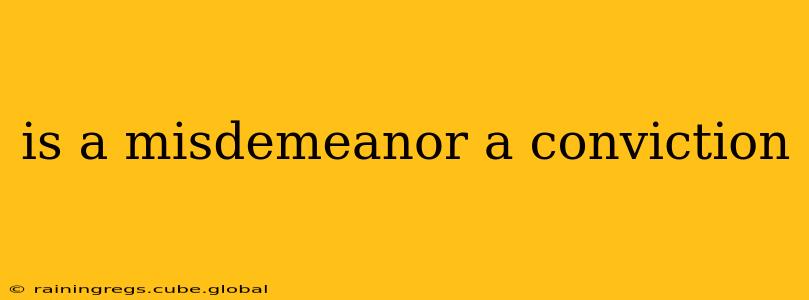Yes, a misdemeanor is a type of criminal conviction. While less serious than a felony, a misdemeanor conviction remains a part of your criminal record and can have significant consequences. This article will delve into what constitutes a misdemeanor conviction, its implications, and answer some frequently asked questions surrounding this topic.
What is a Misdemeanor?
A misdemeanor is a less serious crime than a felony, typically punishable by a fine, jail time of less than one year, or both. The specific penalties for misdemeanors vary widely depending on the jurisdiction (state or local laws) and the specific offense. Examples of misdemeanors include:
- Petty theft: Stealing items of relatively low value.
- Simple assault: Assault without the use of a deadly weapon resulting in minor injuries.
- Driving under the influence (DUI) – first offense (in some jurisdictions): Operating a vehicle while impaired by alcohol or drugs.
- Vandalism: Willful damage to property.
- Minor drug possession: Possession of small amounts of illegal substances.
It's crucial to understand that the definition and penalties for misdemeanors can differ significantly between states and even between counties within the same state.
What are the Implications of a Misdemeanor Conviction?
Even though a misdemeanor is less serious than a felony, a conviction can still have lasting consequences:
- Criminal Record: A misdemeanor conviction becomes part of your criminal record, accessible through background checks.
- Employment: Many employers conduct background checks, and a misdemeanor conviction can hinder your job prospects, especially for certain professions.
- Housing: Some landlords perform background checks, and a misdemeanor conviction might make it difficult to secure housing.
- Education: Certain educational programs or professional licenses might require a clean criminal record.
- Travel: Some countries may deny entry to individuals with criminal convictions, including misdemeanors.
- Legal Rights: Depending on the specific misdemeanor and jurisdiction, you might face limitations on certain legal rights, such as the right to own firearms.
How Long Does a Misdemeanor Stay on Your Record?
The length of time a misdemeanor remains on your record varies depending on the jurisdiction and specific circumstances. Some jurisdictions have laws that seal or expunge misdemeanor records after a certain period, while others don't. It's essential to consult with a legal professional or review your state's laws to determine how long your misdemeanor will remain on your record.
Can a Misdemeanor be Expunged or Sealed?
In some jurisdictions, it's possible to have a misdemeanor expunged or sealed from your record after a certain period. This process involves petitioning the court to have the record officially removed or sealed, making it inaccessible to most background checks. Eligibility for expungement or sealing varies depending on the specific offense, the jurisdiction, and the individual's criminal history. The process often requires meeting specific criteria and demonstrating rehabilitation.
What is the Difference Between a Misdemeanor and a Felony?
The primary difference lies in the severity of the crime and the potential penalties. Felonies are more serious crimes, typically punishable by lengthy prison sentences (a year or more), significant fines, and other harsher penalties. Misdemeanors are less severe, with penalties generally limited to shorter jail terms (less than a year), smaller fines, and less stringent consequences.
Can a Misdemeanor be Reduced to a Non-Conviction?
In some cases, a misdemeanor charge might be reduced to a lesser offense or dismissed entirely through plea bargaining or other legal means. This outcome depends on various factors, including the strength of the prosecution's case, the defendant's criminal history, and the willingness of the prosecutor to negotiate. Legal representation can be crucial in achieving a favorable outcome.
Disclaimer: This information is for educational purposes only and should not be considered legal advice. It's crucial to consult with a legal professional for advice specific to your situation and jurisdiction. Laws regarding misdemeanors and their implications vary significantly by location.
